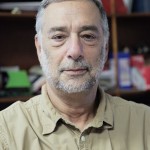
With the U.S. presidential election Tuesday, the upcoming January elections in Israel are not on the minds of many Americans. During a lecture at Ithaca College on Thursday night, Yossi Klein Halevi, research fellow at the Shalom Hartman Institute in Jerusalem and contributing editor to the New Republic, discussed why they should be.
Halevi’s speech, “Looking Within: Israeli Society Faces Itself,” was co-sponsored by Hillel, the Ithaca Area United Jewish Community, the Tri-Fund, Jewish Studies, Temple Beth-El and Student Alliance For Israel.
While the U.S. presidential race may seem divisive to many, Halevi said, Israelis are desperate for an election like it: one with a focus on issues such as the future of the middle class and education, rather than on life-or-death issues, such as the future of peace and war.
“What I would say marks Israeli society today, and may very well determine this upcoming election, is a longing among Israelis for a kind of normalcy,” he said. “Israelis very much want to have the kind of election that you’re having here.”
Israeli elections are based on nationwide proportional representation, and the makeup of the 19th Knesset, the unicameral legislature, will be decided Jan. 22, 2013.
This was Halevi’s third visit to the college. Michael Faber, Jewish chaplain and chief-coordinator of the event, said he admires Halevi’s ability to tackle controversial issues with a fair mind.
“He’s a very thoughtful, sober-minded, non-ideological realist, with a very clear mind and a very clear way of thinking about things,” Faber said.
Halevi is a strong player for Middle East reconciliation efforts, serving as chairman of The Open House, an Arab-Jewish peace education center in Ramle, Israel. He was also a founder and board member of the now-inoperative Israeli Palestinian Media Forum, which brought together a collaboration of Israeli and Palestinian journalists.
The eruption of a social protest movement more than a year ago in Israel brought domestic issues, such as the high cost of living and the relationship with the fervently Orthodox Haredim minority, onto the election agenda. Halevi said this is because citizens realize there is a slim chance of solving the territorial conflict with Palestine anytime soon.
“Given the fact that Israelis tend to be very practical people, they figured, well, we’re not going to be able to solve the big issues anymore, let’s try to deal with issues that perhaps we can solve,” he said.
However, these are tumultuous times in the Middle East. Israel still faces numerous external security threats, with the possibility of a nuclear Iran topping the list.
“I would say that the most interesting question, in terms of these elections, is whether Israelis are going to vote based on their longing for a normal domestic agenda or whether these external threats are going to impinge on how people will decide to vote,” Halevi said.
Ithaca resident Richard Rosenfield is a member of both the local Reform and Conservative Jewish congregations in town. He said he was glad Halevi brought up domestic efforts for religious pluralism in Israel.
“I’ve heard about it from the reform movement, but it’s wonderful to hear about it from someone who doesn’t have a connection to the movement and confirms it’s really happening there,” he said.
Marcia Zax, board co-chair of the Ithaca Area United Jewish Community, said there is more than one important upcoming election in the world, but you wouldn’t know it by looking at the American news media.
“There were a lot of things he spoke about in terms of politics and the election that we don’t see at all discussed in our media here,” she said. “I’m glad he brought them to light.”







